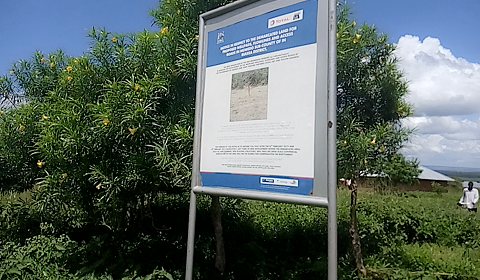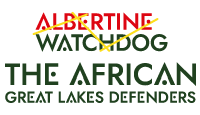The community of Ngwedo Sub-county affected by the Tilenga Project accused Total and Atacama Consulting for avoiding responsibility in the ongoing process of the Tilenga Project

Ngwedo sub-county is located in Buliisa district, Bunyoro sub-region with mainly Bagungu, Banyoro and other tribes such as Alur. It’s a remote, underdeveloped location with poor internet connectivity, local communities affected by oil, gas and mining projects do not have access to such information and generally lack understanding of the nature, process, and impact of extractive industries. As a result, local communities are generally not aware of their rights, let alone the overall regulatory framework for extractive projects. They are therefore unable to organize themselves to effectively participate in the design, planning and decision-making process around oil, gas, mining and other large scale infrastructure projects taking place in their land.
Between 15- 29 October 2019, The Albertine Watch conducted interviews in Ngwedo from two villages of Kisomere and Avogera to understand the community perceptions on the ongoing Tilenga Project. The interviews revealed that in other villages like Kasinyi, Uduk (ii) and Kilyango communities are facing similar challenges like those of Kisomere and Avogera.
In all the affected Villages Total E and P together with Tullow Uganda have erected signposts and marks on the houses that will face demolition.
In the instruction on signposts, they said the markers on the houses should not be removed because they carried out a survey and census which led to the demarcation of the specific areas|.
According to the notice, all the affected persons within the demarcated area were identified and their properties were recorded for compensation.
It also showed that after the dates 18th and 19th of February this year, no form of development within the area such as land clearing, erecting of new structures, planting of new trees and commercial agriculture is allowed.
Uzengi (not a real name), a resident of Avogera said after signing the cutoff date, life became so difficult for him and his family.
‘’We had remained with half an acre of land which would not be able to sustain my family. We waited until August this year for compensation but to no avail, we even don’t know the district land rates for compensation”, He added.
He also complained of his family burial sites because he claims they are not considered for compensation.
“The land is already gazetted which means, no activities should take place but where do we bury the dead, “He asked.
The surveys to mark the road for tarmacking were done but they refused to compensate for the house but they agree to compensate the Veranda.
He blamed the company subcontracted by Total E&P, the Atacama for avoiding responsibility.
He said the government understands what is transpiring but they are not helping out.
He said the oil company should allow them to have access to their land for cultivation “Why are they taking so long why don’t they give us our money and we go purchase land elsewhere”, He wondered.
He asked them to increase the rates because the value for money is increasing “Why are they selling the land the same rate as we sell for our relatives”.
Uzengi said there were scenarios that happened in the central processing unit where land was compensated at extremely low rates which should not happen to them because the oil companies and government will benefit from the oil at their own expense.
Bwad (not a real name), a resident from Avogera village said that Oil companies told them to plant short-term crops and yet they don’t have land to cultivate.
“We have taken a year yet they have blocked us from cultivating yet life is increasingly becoming hard”, Bwad said.
She added that the community in Avogera predominantly depends on cassava yet it takes more than a year to cultivate which needs land.
She wonders when they will pay them because they are no longer able to send their children to school.
She said the Atacama oil company refused to pay for certain things like traditional Shrines.
Nyabingi, resettlement planning committee member of the resettlement action plan1 told the Albertine Watch that assessment was done but the land rates and crops were not given out.
The oil company together with the Buliisa district and ministry had their own descriptive ways of rating the crops which eliminated most natives from benefitting from the destroyed crops.
The oil company used standard agronomic practices yet the locals had their own ways of handling farming which pushed out more people from benefitting from the compensation.
Atacama Consulting and Total is rumored to have left the area yet the locals have not yet been compensated.
He is wondering when the locals will start receiving payments and what will happen to those that were given cut off dates.
The locals had been having complaints but nothing was done about the grievance form, therefore, they are seeking an independent body to handle the grievances.
They encouraged locals to open up businesses but the oil workers are not allowed to eat food from the make-shift restaurants.
Total E&P claims that locals don’t meet the minimum standards for procurement.
He suggests that the land rates should be increased to eight million an acre.
Afo, a resident of Kisomere village informed the Albertine Watch that they were not issued documentation after the survey because Atacama and Total used GPS instead of a tape measure.
Total E&P wants them to register their businesses and attain documentation through a training course which is hard for the locals.
“Look at the sun, the year has come to an end and these people have adamantly refused to pay us”, He said.
The LC1 of another village (name withheld for security reasons) said the compensation methodology has frustrated the efforts of the locals because they pay it in their own terms.
He said they also take their own time to pay the compensation like one to 1 ½ year.
Oil, gas and mining projects, given their scale, intensity, and duration, have a profound impact on local communities, their health, safety and environment, economic livelihoods, and social relations. With many of these projects increasingly taking place in Uganda that are experiencing serious problems with her regulatory framework, revenue management, and government capacities, the risk of a ‘resource curse’ is likely to be high in Uganda.
Institutional and regulatory reform can help reduce this risk. However, experience shows that even if laws, regulations, and management systems are in place, the daily reality of political interference, corruption and other forms of ‘elite capture’ in countries such as South Sudan, DRC, Nigeria, Kenya, Afghanistan and other countries where there are a lot of extractive activities, often means that oil, gas and mining projects do not play their foreseen role as ‘kick-starters’ of the local economy. On the contrary, local communities are often faced with the negative impacts of these projects in the form of pollution, social disruption, human rights abuse and disturbed local markets.
With little or no access to relevant information and technical advice, limited public participation and weak organization, local communities confronted with the arrival of oil, gas and mining companies often cannot realistically assess the potential risks or advantages that a project might bring to their community. As a result, they are unable to engage effectively and in a timely manner with government and companies to ensure that the project becomes beneficial to their community. If subsequent negative impacts are not adequately redressed, and if benefits are unevenly distributed among different groups, the trust will be undermined and the risk of communal and community, company and government tensions will increase. When this occurs over a longer period of time, some community members like the unemployed youth might in extreme cases resort to the destruction of and violence against the company and government installations and personnel.
At Albertine Watch, we believe that strengthening local communities through information sharing, skills development, and meaningful, multi-stakeholder dialogue will help to ensure that oil, gas and mining projects if accepted by the communities, benefit ordinary citizens. Local communities must be enabled to develop and express their own vision for a sustainable future and to understand the structure of the extractives industry, the national legal and policy framework, and the international normative frameworks and practices. With the support of a strong civil society network, they will then be able to engage more effectively and constructively with companies and government. As a result, social tensions and violent conflict in oil, gas and mining areas can be significantly reduced or even prevented. If also combined with responsible production and transparent and accountable revenue management, oil, gas, and mining can bring significant social and economic benefits to the citizens of Uganda.

That’s a lie